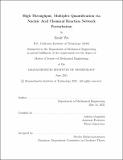High Throughput, Multiplex Quantification via Nucleic Acid Chemical Reaction Network Perturbation
Author(s)
Wu, Emily
DownloadThesis PDF (25.16Mb)
Advisor
Gopinath, Ashwin
Terms of use
Metadata
Show full item recordAbstract
High throughput, multiplexed quantification has the potential to transform molecular diagnostics. For example, proteomic analysis could be a powerful medical tool to assess a patient's current state of health. However, most of the widely used molecular quantification techniques have yet to achieve both high throughput and multiplexing. This work proposes perturbative quantification, a nucleic acid chemical reaction network-based approach as a potential solution, and builds the foundation for this approach. The fundamental idea of perturbative quantification is to translate the molecular composition of a sample into a nucleic acid signature via perturbation of a nucleic acid chemical reaction network. This signature consists of signal nucleic acid strands with a set of concentrations unique to the sample, and can be efficiently read out by sequencing. A trained machine learning network can then be used to determine the molecular composition of the sample that produced the nucleic acid signature, thus quantifying the sample.
This thesis provides a proof of concept for perturbative quantification by simulating DNA chemical reaction networks perturbed with DNA strands as the target molecules, and uses the simulated data to train multilayer perceptron (MLP) networks to quantify DNA samples. On the experimental side, this work proposes a potential implementation of perturbative quantification, and develops some of the necessary methods. Lastly, a data analysis technique to extract signal DNA sequence counts from noisy sequencing data was also developed. Together, these steps lay the groundwork for realizing perturbative quantification as a high throughput, multiplex approach to quantification.
Date issued
2021-06Department
Massachusetts Institute of Technology. Department of Mechanical EngineeringPublisher
Massachusetts Institute of Technology